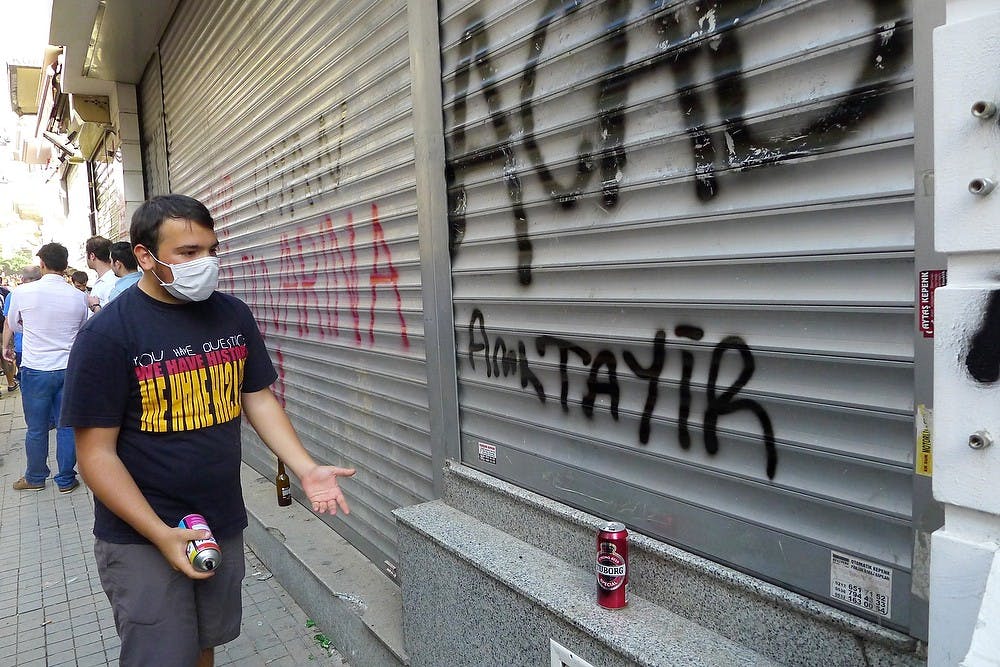When construction management senior Jason Korth looks outside his window, he sees crowds of protesters.
They walk shoulder to shoulder through the streets of Izmir, Turkey, chanting: “We stand together against the government.” Counting the surrounding areas, the crowd totals nearly 3,000. For Korth, a study abroad trip landed him in the middle of a growing public demonstration that has taken a violent turn.
“We haven’t been allowed out the last two nights since the protests began on Friday,” Korth said in an email. “It is something I’ve never seen before, and (it is) quite frightening.”
Tension began to form in the country when Turkish Prime Minister Recep Tayyip Erdogan announced the government’s plan to demolish Gezi Park, one of Istanbul’s few remaining green spaces. What began as a small demonstration in the city’s Taksim Square escalated into violent riots when police intervened Saturday. The riots have spread quickly to nearby Izmir and Ankara, the capital.
Police attacked protesters early Saturday morning using tear gas and blasting water from high-pressure hoses. Reports also have emerged that police forces are using Agent Orange, a toxic chemical used during the Vietnam War.
Korth said protesters have begun vandalizing nearby shops. CNN reported more than 900 protesters have been detained by Turkish police, with about 79 people injured.
Graduate student Eyup Civelek, president of MSU’s Turkish Student Association, or MSUTSA, said his friends in Turkey have posted shocking photos of the riots on social media.
“There’s blood everywhere,” Civelek said. “I can’t imagine why (the police are) doing such a horrible thing. They’re just protesting; they have the right to congregate.”
Although his study abroad group is staying in Ankara, nearly 300 miles outside Istanbul, comparative cultures and politics junior Kyle Rosher said the tension is impossible to ignore.
“The cars outside on the road are all honking their horns,” Rosher said in an email. “Many are holding down on their horns all the way down the road, banging pots and pans out their windows, blasting their music and waving Turkish flags.”
With frustration toward the prime minister building, Civelek said the protesters’ motives have spread beyond the destruction of Gezi Park. The Grand National Assembly of Turkey, the country’s parliament, also has placed new regulations on the sale of alcohol, a concept he said many are angry about.
“(Erdogan) made a choice, which was very authoritarian and nothing related to any kind of democracy,” he said. “We’re going to say enough is enough. Police retaliate when they are doing nothing. They’re using that kind of force to oppress people.”
Graduate student and MSUTSA member Serhat Selcuk Bucak said anger also has stemmed from the lack of riot coverage from Turkish media.
“Some people think it’s more of a ‘I can do what I want here, you can’t stop me’ attitude,” Bucak said. “People think the (Turkish) media is working for the government, and that’s building tension.”
With violence occurring right outside his window, construction management senior Dev Rajeeth, also on a study abroad trip in the country, said he has spoken with protesters to become more aware of their reasoning.
“They have every right to be upset,” Rajeeth said. “I may condemn all the violence, but this is a means people have used to bring change over the years.”
Overall, Korth said the events have brought him a new understanding of the Turkish culture.
“It has taught me how to deal with any type of difficulty that may occur outside the U.S., as well as (how to) respect other people’s ideologies,” he said.
Civelek said democracy has remained important to the Turkish people, and he does not expect protestors to back down willingly.
“It makes me very sad, and it horrifies me,” he said. “We have never surrendered to any kind of power, and we want to make sure our democracy is working well.”
Support student media!
Please consider donating to The State News and help fund the future of journalism.
Discussion
Share and discuss “Protests in Turkey affect students studying abroad” on social media.







